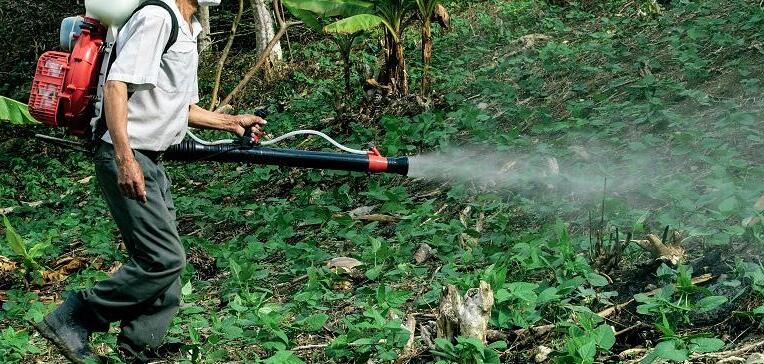
3 minute read
WHY INVESTORS MUST ENGAGE WITH THE PESTICIDE INDUSTRY
from Pesticide News - Issue 131
by PAN UK
By Eve Gleeson, ShareAction
A new briefing from ShareAction highlights why pesticide companies, and their investors, must urgently address the industry’s contribution to biodiversity loss.
Food production today has drastic impacts on nature. The food and agriculture industry is one of the biggest contributors to pollution and land-use change, such as deforestation and wetland clearing which are two direct drivers of the biodiversity crisis according to International Science-Policy Platform on Biodiversity and Ecosystem Services (IPBES). Pesticides are at the heart of this system.
Pesticides damage nature’s innate ability to provide services we all rely on, such as pollination and fertile soils. In the UK alone, neonicotinoids– a class of pesticides– have been shown to reduce bee reproduction by 44 percent. It’s more clear than ever that our food system is hooked on pesticides.
Enormous volumes of pesticides are used to grow crops that are not destined for our plates. Countries like China, the United States, Brazil and Argentina, which use the highest volumes of pesticides, are using them to produce land-hungry crops like soy and maize. The vast majority of those harvests is destined for animal feed, highly processed food products and biofuels.
We have equally effective and more sustainable solutions such as agroecology and precision technologies that, if scaled up properly, can still allow us to produce enough food to feed a growing population while reducing impacts on nature.
Companies, and their investors, must be a part of the transition away from this deep-seated reliance on harmful synthetic pesticides toward more sustainable alternatives. In fact, other key stakeholders including regulators are already working to jumpstart this transition. At the global level, the recently agreed Kunming-Montreal Global Biodiversity Framework explicitly includes a target on reducing the risks pesticides pose to biodiversity by half by 2030 (Target 7).
National legislation is on the way to implement this target, which we hope will specify exactly how this risk can be reduced. We anticipate that national legislation addressing this target will also align with the Framework’s Target 15. This expects companies and financial institutions to assess and publish how their activities impact on biodiversity, and how dependent their businesses are on the services that nature provides.
In fact, regional and national policymakers are already starting to regulate companies and financial institutions on the issue of pesticide-related biodiversity loss. For example, the European Union has several regulations explicitly targeting companies, such as the EU Prior Informed Consent (PIC) Regulation. The regulation requires corporations to disclosure their exports of banned pesticides. Meanwhile, countries ranging from Colombia to South Africa have developed robust Green Taxonomies to crack down on greenwashing in financial institutions that contribute to pollution caused by pesticides.
Yet pesticide companies most at fault for consistently lobbying against legislative efforts to restrict dangerous pesticides are the very same ones that dominate the pesticides market: BASF, Bayer, Corteva, FMC Corporation, Syngenta and UPL, who control 70 percent of global pesticide sales. All six of these companies continue to produce harmful pesticide products and neglect to adopt effective biodiversity strategies.
Over 2,000 investors hold shares (worth over US$10,000) in at least one of the industry’s five largest publicly traded companies, with 89 investors holding shares in all five. Debt investors like banks and asset managers regularly provide loans and invest in bonds to support the ongoing operations of these companies. Because they finance the activities of these companies by holding shares and providing them with debt, investors can demand that the companies they invest in change their behaviour.
If they are serious about change, investors need to start taking action on pesticiderelated biodiversity loss, including expanding their biodiversity strategies, advocating for improved regulation of the pesticides industry, and engaging with all pesticide companies to push for essential changes.
Over the next few months, we aim to attend the annual shareholder meetings of all publicly listed target companies - including BASF, Bayer, Corteva, FMC Corporation and UPL. At these meetings we will demand that companies start addressing the severe impacts of their pesticide products on biodiversity. Due to their market dominance, change within these companies will drastically reduce the overall impact of the pesticide industry on biodiversity. As owners and financiers of the most dominant pesticide companies, investors must urgently step up to demand this change.
Eve Gleeson is the Research Manager for ShareAction’s Biodiversity Programme. She leads research and report writing on financial sector action on biodiversity and the pesticides industry. Prior to ShareAction, Eve was a research fellow at Food Tank, a non-profit focusing on sustainable food systems, where she researched and wrote about various issues relating to the global food system. Eve formerly worked in threat intelligence for a political risk consulting firm. Read the briefing 'A Growing Problem' here.





